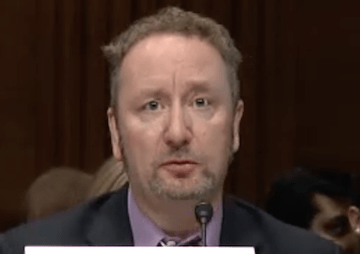Addressing the Senate, an Anti-Austerity Economist Criticizes U.S. Budget Policy
There is much confusion, politically sown, about what debt is, what it does and what it costs. This includes the false ideas that the government deficit is unsustainable, that "entitlements" are bleeding us and that paying interest on the national debt displaces money that would otherwise be spent on public programs. Dr. Mark Blyth, professor of international political economy, Watson Institute, Brown University. (U.S. Senate)
Dr. Mark Blyth, professor of international political economy, Watson Institute, Brown University. (U.S. Senate)
By Mark BlythThe following text was prepared by Brown University political economist Mark Blyth, author of “Austerity: The History of a Dangerous Idea” (Oxford University Press 2013), for a U.S. Senate hearing held March 11 titled: “The Better Way: Benefits of a Balanced Budget.” It is a scholarly rebuke of the notions about public debt and investment in social welfare that are driving domestic economic policy and shaping American life. The text is reproduced from a PDF published on the website of the Senate Budget Committee. Blyth’s presentation is viewable here, starting at the 46:20 mark.
Good Morning Chairman Enzi, Ranking Member Sanders, and Members of the Committee.
My name is Mark Blyth and I am the Eastman Professor of Political Economy at the Watson Institute for International Studies and Brown University in Providence RI. I am also the author of a book entitled Austerity: The History of a Dangerous Idea (Oxford University Press 2013) a book, which oddly just received a national award in Germany, the country most associated with budgetary austerity. Given that irony is not a German national trait, it might be the case that even the Germans are re-thinking their stance on balanced budgets. As I shall show you today, it’s really not working out so well in Europe and it would be a disaster if it were tried here too.
And yet balancing the budget as a matter of principle is intuitive. After all, you can’t spend more than you earn. It is also appealing. After all, people want more money in their pockets rather than less, so spending ‘other people’s money’ now so that they would have less in the future because of debt interest repayments seems to be the height of folly. But balancing the budget because of these arguments is also folly. While they are intuitive, these arguments are systematically wrong, because they are based upon two faulty analogies: one drawn between households firms and states and another between savings always being good and spending always being bad. I begin by taking each in turn before giving more specific examples.
The flaw in the first analogy is that the national or federal government’s budget is nothing but the sum of the budgets of the households and firms that comprise it. This is wrong, and for the United States of America in particular, it is absurd.
First, national governments do not have income in the same way individuals have income. Rather, individuals only have income by virtue of the existence of the government. Think of earning a buck in a job. What makes that possible is not just the labor contract, but also the existence of property rights, courts, police, roads, airports, education, and a host of other state provided functions. Don’t believe me? Go look at Somalia’s rate of job growth. With no state to protect both parties to the transaction, it’s hard to make a buck.
Second, states’ incomes are not like private incomes. No one ‘pays’ the state an allowance that it spends. States cannot ‘live beyond their means’ precisely because they set those means. If those means fall short, then there are deficits. Given this, it’s pretty easy to understand why there are deficits. The US has been cutting taxes at a federal level, especially on high earners, since 1979 (slide 1). Given this, the US federal state taxes in real terms at about 17 percent of GDP and spends about 21 percent. That’s a revenue-generated deficit. It’s not a spending problem because in comparison to all the other rich countries in the world, the US spends much less through the government (see slide 2), and apart from the deficit rising because of the financial crisis, federal spending has hovered around 20 percent of GDP since 1980 (slide 3). So if there is a spending crisis, it’s on the revenue side. We have cut too much tax, especially on the top end of the income distribution.
Third, unlike households, the United States issues its own cash, owes itself money, borrows other people’s savings with its own paper, and brings new people into the household so that it can tax them across the next several generations. National governments can do all that, families and firms cannot and US states cannot. And no one can do that better than the United States national government since its debt is backed up by the world’s most dynamic economy, 14 aircraft carriers, and positive intergenerational capacity to tax. Let me unpack this.
During the 2008 financial crisis, despite the crisis developing in the United States, the only asset investors around the world wanted to hold was US dollars and US dollar debt. The yields on the US ten year T-Bill FELL at the height of the crisis. (See slide 4) If there was any investor concern about the stability of the US those yields should have gone up. They went down despite the crisis and the federal debt going up as a result of bailing out the financial sector and the ensuing recession. The whole world, it seemed, wanted dollars and dollar debt despite the US generating the crisis. Why was this?
Simply because, and quite unlike on the state level, because it controls its own money, the US federal government was able to quickly bail its banks and triage the economy via quantitative easing. In countries that could not do this, those in the Euro area for example, they were forced to try and balance their budgets. The result in Europe has been plain to see – a massive contraction in economic activity, with those that cut the most seeing the steepest collapse in growth and, paradoxically, the biggest buildup in debts. This is hardly a surprise historically since pretty much all attempts to balance budgets have resulted in recessions or depressions (see slide 5).
Indeed, the family-state analogy is not just wrong, it is harmful since it makes us forget that the money that the state borrows is not money from some outside agency that will come and shut us down if we fail to make payments – like ‘The Iron Bank of Bravos’ in ‘Game of Thrones’ – its money that we owe ourselves.
The government’s debt is the asset of the private sector. It is simply a set of credit claims of one part of society on another, intermediated by the government so that we can collectively make investments in our future. So when you say you want less government debt, what you are really saying is that you want less private sector assets, since we are often both borrowers and lenders at the same time.
For example, if you have a private pension you have government debt in you portfolio. It’s a safe, and in the case of the US, guaranteed return. It anchors, as a hedge, the other assets in that portfolio that make you more money. You may pay taxes and some part of that may go to pay debt interest, but that debt interest is paid to your pension fund and so adds cash to your pension.
Indeed, US debt, particularly the ten-year bond, plays a critical role in our economy that is seldom recognized. It is what regulators call a ‘zero risk weighted’ asset. So when banks buy them and put them on their books this forms the base-asset of their funding and lending pyramid. It is the asset that banks use as collateral to borrow money from other banks and nonbanks to fund themselves. Reduce the supply of ten year T-Bills by paying back ‘all that debt’ and banks’ funding costs, and quite quickly the rates ordinary Americans’ pay on their mortgages and car loans, will rise precipitously. Indeed, as our society ages and investors increasingly move from equity to fixed income investments, what would happen to their returns if we reduced the supply of fixed income investments, the first line of which is US debt? They would pay more for less, and have lower retirement incomes. I’d like to see a politician taking the blame for that one.Similarly, the notion that we are all ‘in hock to foreigners’ paying them interest is also mistaken. As slide 6 shows, not only is around 70 percent of US debt domestically held (doing quite productive things as per above), its good that foreigners hold our debt. China, for example, owns $1.24 trillion of our debt, which is not nearly as bad as one thinks. Because for the past twenty years we have been selling them bits of paper yielding two percent interest and they have been giving us super-cheap everything else (from TV’s to Computers to Toys) in exchange. As a result our real consumption increased despite a slump in wage growth and the off-shoring of manufacturing jobs while we intermediated their savings. That meant our lending rates went down so we could enjoy lower rates on mortgages and other products.
Even better, China is an export dependent economy and will be for at least the next ten years. So until such a time as they clean up their own banking sector, which is in far worse shape than the US, they will continue to accumulate our debt without being able to liquidate it, for if they did (and what else are they going to hold – the Euro?) it would hurt us but it would destroy their exports and hence their economy. The damage would be completely asymmetric. The fact that we pay them interest is a small price to pay because, guess what they do with the interest? That’s right, they buy more of our debt, driving the price down once again. This is trade of the century. We should worry when it ends, not that it exists.
And as for the sustainability of all this debt, only three things matter. The first is the rate of growth in the stock of debt, the second is the rate of growth in GDP, and the third is rate of growth in population. On all three measures the US fares better than almost anyone else in the developed world.
Our demographics are positive and this is important because what matters for government debt in a fiat money system is the intergenerational capacity to tax. Promises made now will be redeemed by a claim on a bigger population and a bigger economy. If you economy is growing (and the US is leading the pack) and your population if growing (we do OK there), then your stock of debt as a share of your GDP declines while your ability to service that debt increases. If you are Japan or Italy, with low growth, high debt, bad demographics and an inability to get immigration right, then you do have a long run fiscal problem. But the US, which issues the global reserve asset (the dollar) that every other country wants to hold and indeed has to earn in order to conduct foreign trade, has all three things heading in the right way.
In short, the day the US is insolvent is the day that every other sovereign alternative on earth has already gone up in flames. The notion that we have a fiscal crisis that can only be alleviated by balancing the budget is not just wrong. It’s harmful.
Turning now to savings and spending, it’s interesting to compare the way different countries speak about debt and savings and the like. For the Germans, debt is ‘Schuld’ – which means ‘guilt.’ Little wonder perhaps that they insist on the Greeks paying theirs’ back when the Germans were among the prime defaulters and debt-forgiveness beneficiaries of the 20th Century. For the English speaking world, ‘credit’ comes from the Italian “Credere’ – to believe – as in the Catholic statement of faith – the “Credo.” So we have belief on the one hand when it comes to debt, but can feel guilty about it too. We also inherit a bit of the German attitude to savings “Sparen” – which appears in the English “sparingly.” The net result is a bias in our language where debt and spending is bad and savings are good. But if debt is simply a credit claim of one part of society on another, and it all sums to zero – assets must equal liabilities after all – and if my income comes from your debt – and debt, crucially, allows long term investments, this bias does astonishing harm.
Government debt is productive insofar as it funds activities that the private sector cannot fund given their respective time horizons. Many firms have tried to make money out of roads. Most have failed and ended up being bailed-out, for example. But more importantly, if debt is guilt, it can be a very productive guilt. Consider US investment in basic Research and Development (R and D).
Around 40 percent of the basic R and D that makes the pharmaceutical and biotech industries comes from National Institutes of Health funding. Similarly, take out the I-Phone in your pocket. The critical technologies that made this amazing product possible are the TCP/IP internet protocol (DARPA), the GPS network (US Navy) and the touch-screen interface (US Air Force). That Apple put it all in a shiny box and became the best company ever is true. But without those investments, made possible by long-term patient debt, there would be no I- Phone. Indeed, if you want to see how important federal R and D funded by debt is, try playing the stock market over the next decade with this observation.
In the 1960s the US government funded microelectronics. In the 1980s we had the microchip revolution. In the 1970s we began to fund computers. In the 1990s we had the tech stock boom. The federal government can’t take the blame for the mortgage boom, no matter how hard we try to blame Fannie and Freddie – lots of countries had mortgage busts with neither a Fannie nor a Freddie anywhere near them – but we did start to seriously fund biotech in the late 1990s. No prizes for guessing where the next industrial revolution comes from? But if that is the case, what would happen if our technological edge withered, which is exactly what would happen if funding is cut due to our ‘guilt’ overriding our ‘belief’ in our future as a country and our resulting confusions over debt? Debt is investment, even public debt, it is not a deadweight loss, and without it we would never have the industries that we have today.A similar confusion pervades the discussion on productive and unproductive – wasteful – government spending. No doubt there is waste. But the private sector has waste too. It’s just that they get to write it off against taxes. But both sectors generate income and the money spent in a local business makes no distinction about who spends it or which sector it came from. Allow me to update a story once told, I believe, by the economist Robert Solow, to make this point clearer.
Imagine the world’s worst author. Truly, he is a literary disaster. Despite his epic will to publish that novel, it will never happen. But he keeps going, living in poverty and dying in obscurity. But he bought a series of Apple computers to help him on his epic journey, and all that added to GDP, so that’s good.
Now consider a government employee whose income is generated by taxes, taxes that also bought the Apple Computer that she uses to process an NIH grant that goes to a researcher at a state university. That researcher, funded by the federal government, goes on to invent a molecule that the pharmaceutical industry buys and turns into a major new therapy. Yet we tend to see this as ‘unproductive spending.’ Yet what is the difference between the two, especially when that same federal worker goes to the supermarket and shops with her government paycheck at the end of the week, and spends more than our heroic author? Does that not add to the economy either? Somehow we seem to think not. There is so much confusion, politically sown, about what debt is, what it does, and what it costs. They tend to cluster around three themes:
1) We have a fiscal crisis in this country – our debt and deficits are unsustainable.
I think I have shown why this is nonsense already, but one further point is worth making. To know that this is the case you would have to know what the economy looks like 20 years from now. Indeed, the CBO makes such projections at the request of Congress, with the document, “Budgetary and Economic Outcomes Under Paths for Federal Revenues and Noninterest Spending Specified by Chairman Ryan, April 2014,” being a particular example of this genre.
It’s rubbish. Not because the good people in the CBO don’t know what they are doing, but because you (Congress) have given them an impossible task. You are asking them to estimate the budget of the US and its debt levels out to 2040. Exercises such as this are worse than useless, they are harmful because the give a false sense of certainty where none should exist.
Imagine that the CBO was asked to do the same projections in 1989 for 2009. What would it have looked like? Well, even if it had got the end of the cold war right and cost-accounted it correctly (doubtful) it would have missed the budgetary effect of, for example, the late 1980s recession, the tech stock boom and bust, 9-11, the invasion of Iraq and consequent long run costs to the budget, the oil price drop of the 1990s, the oil price rise of the 2000s, the oil price drop of the 2010’s, the global financial crisis, and the Red Sox winning two World Series.
There is simply no way this could be known in advance and all these things (apart from the Red Sox winning) have massive budgetary effects. As such, projecting out these smooth linear trend lines is negative information. We don’t know what the future holds but we do know that whatever it will hold it will not be that projection. So to base policy on that projection is to politically create the future today before it comes to pass. I believe in other areas of life we call this ‘bait and switch.’ My favorite example of this was when the federal government unexpectedly balanced its budget in 1999 and then (and now) Whitehouse economic advisory Gene Sperling predicted, “surpluses as far as the eye can see.” George Bush based his tax cuts upon that trend being true. They lasted two years.
2) Entitlements are the problem and they need to be cut.
I am no expert on this and defer to those that are. And I am the first person to say that any society that spends 17 percent of its GDP on healthcare has serious problems with the issue of mortality. But more seriously, but this also strikes me as economic nonsense. First of all, if by entitlements we mean social security, it’s not a part of the budget. The reason that it appears in budget projections is that the CBO assumes when the current fund gets into trouble in about 20 years, the government will put it on the budget. But there is no reason to assume that. First, it’s a pay as you go system. It’s not a part of the budget so it can’t be a part of the deficit. Like the general budget, there is a revenue problem with social security, not a spending problem, looming very far off. The payroll tax that funds it is currently capped at $177,000. Why do that if it’s a universal program? Simply lift the payroll cap completely and around 80 percent of the problem disappears. Second, if by entitlements we mean Medicare then I lack the expertise to comment. But it is odd that when we talk about entitlements we do not talk about how US corporations, as legal persons, can legitimately transfer price their products, domicile for tax purposes in Ireland and incorporate in a subsidiary in Holland that lowers their taxes further. In 2010 I paid more taxes than Bank of America, and they had already received a bailout. If we are going to talk entitlements, then surely we should have that on the table?
3) Interest on the debt is going to swallow every tax dollar we bring in, leaving nothing for any other program
Again, apart from this being based upon completely unbelievable linear projections of the future, there is no evidence to support this belief. If it were even remotely likely then we should see it in our forward rates. Yet today as I write this March 9th 2014, the US 30 Bond yield sits a 2.8 percent. When you consider that this price is the market making a 30-year bet on the future, a yield of 2.8 percent doesn’t even factor in inflation over that period. If the above statement is true then global financial markets seem completely unaware of it.
4) Finally, there is a whole bunch of homespun homilies and metaphors that talk about the risk to future generations of racking up debt today. Some typical examples are:
It is irresponsible and immoral to kick the can down the road. We cannot saddle our grandchildren with a crushing burden of debt. We need a budget that is painful to all (today) in order to protect future generations. Future generations are going to have an inferior standard of living because of our fiscally irresponsible behavior.
I think it should be clear from what I have already said already that this is dubious at best. What we have is a funding crisis, not a spending crisis. The problem is too low revenues, not too high spending. The US has plenty of spare tax capacity, especially at the top. But this set of platitudes I find to be deeply offensive because I am the product of the very thing you want to cut. In fairness, as an emigrant I was raised on someone else’s tax dollar (the UK’s) but there as many US born citizens now paying taxes in the UK, so the point that I am about to make stands.I was born in 1967 in a working class family on the East Coast of Scotland. My mother died when I was three weeks old and I was given up to my paternal grandmother for my care. Our income was her state retirement pension (an entitlement). I went to school (paid by taxes) and ate free meals at school (an entitlement). I went to university for free (an entitlement) and now I am a professor at an Ivy League school. As such, I will pay more in taxes over my lifetime to the US government at a much higher rate, and for longer, than I would have ever done if these entitlements had not been there. They made me what I am today and I am a fiscal net positive long asset.
So when people say “we cannot saddle our grandchildren with a crushing burden of debt,” or that “we need a budget that is painful to all (today) in order to protect future generations,” they are really saying “lets shrink the economy today so that the parents of today earn less money and pay more for services. That will make sure that their grandchildren grow up poorer, with a smaller economy, and a worse education.” Quite how that is supposed to keep America great going forward is a mystery to me (unless it’s the magic of tax cuts themselves, but they keep failing to show up too).
Far from “Future generations [having] an inferior standard of living because of our fiscally irresponsible behavior,” cutting now and deeply so will produce the very outcomes that have brought Europe to the precipice. Indeed, we have been running a giant natural experiment across the world for the past several years on balanced budgets and the results are in.
The US hardly cut (apart from the sequester) and as a result it has grown and now leads the pack. Europe cut deeply and apart from Germany (which lives off other countries spending via exports) has seen their GDP shrink and their debts explode since they started cutting. The cuts lowered GDP and worsened the debt profile of the countries and the cut the most. We have all the evidence we need to make a judgment on this, so why do we keep cutting?
My explanation is that what finance types would call a ‘class specific put option’ has been executed on the American public, and they folks that cashed-in this contract are a bit nervous about being found out.
A put option is a contract where the seller of the contract gets a fee for offering protection against a default and the buyer gets protection. In 2007/8 the US financial system, which basically looks after the assets and incomes of (primarily) the top 30 percent of the US income distribution, went bust. It called in the option the public that had unknowingly written as taxpayers bailed out ‘too big to fail’ institutions. But given that the banks’ assets are the investors’ liabilities and vice versa, when you bail the banks you bail out the assets of the richest part of society. The result of this balance sheet transfer is the generation of massive amounts of public debt as private debt is taken onto the federal government’s balance sheet via bailouts, recapitalizations, and most of all, because of the recession this bust produces. Having produced all this debt via asset bailouts and bank-induced recession, the top part of the income distribution then screams loudly about the terrible debts incurred by overspending (even if it was to save their own assets) and demand cuts to programs that they don’t consume. This is why it’s a class specific put option. As the old adage has it, ‘a boom is when the rich get richer and a recession is when the poor get poorer.’
It is also of little surprise to me to find out that billionaire philanthropists and the richest CEO’s in the world fund the main institutions fostering this concern, such as the Business Roundtable and the Petersen Foundation. After all, these are smart people and they know that having made off with 90 percent of the gains of the past 20 years, and then having had their assets bailed out on top of that, they are a bit worried that the public might just come after them for some of the share of the costs.
To make sure that never happens we must make sure that we all believe that China owns the US (it doesn’t) that Social Security is bust (it isn’t) and that the only way to grow the economy is to shrink it now (which, if it were true, would mean that if we shut down the economy from January to June every year and then opened it up again in July, the resulting boom would make the economy bigger than it would have been had it been open all year). Yes, it really is that absurd.
At the end of the day I came to the United States because it is the greatest country in the world. I sincerely believe that. My wife, who comes from East Berlin, knows that better than most. But what made the US great was that it didn’t give a hoot about debt when it came to fighting fascism and communism. It invested public money in the technologies of the future 25 years out and reaped the benefits. It gave everyone a chance to be an ivy-league professor. And now we seem to want to stop all that for the sake of a false analogy between a household and a superpower’s budget. Surely we are better than that? Surely one day I can dream of taking an Amtrak from Boston to New York at a speed greater than 45 miles per hour? Surely one day I will land in JFK and not think that I am in the third world? To do that, we need to stop taking nonsense about debt and start talking sense about investment. They are two sides of the same coin, not a choice we need to make between the two.
Your support matters…Independent journalism is under threat and overshadowed by heavily funded mainstream media.
You can help level the playing field. Become a member.
Your tax-deductible contribution keeps us digging beneath the headlines to give you thought-provoking, investigative reporting and analysis that unearths what's really happening- without compromise.
Give today to support our courageous, independent journalists.









You need to be a supporter to comment.
There are currently no responses to this article.
Be the first to respond.